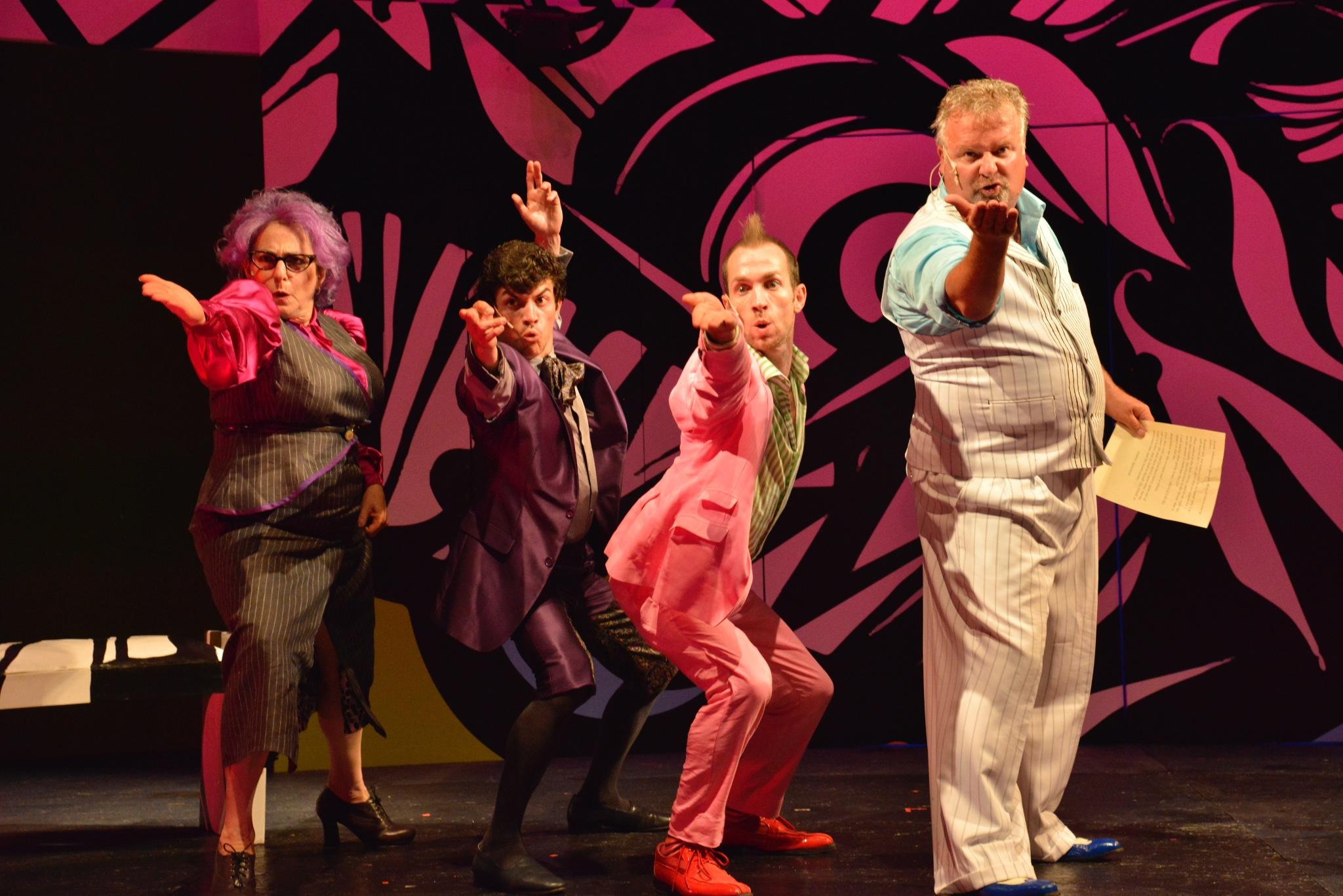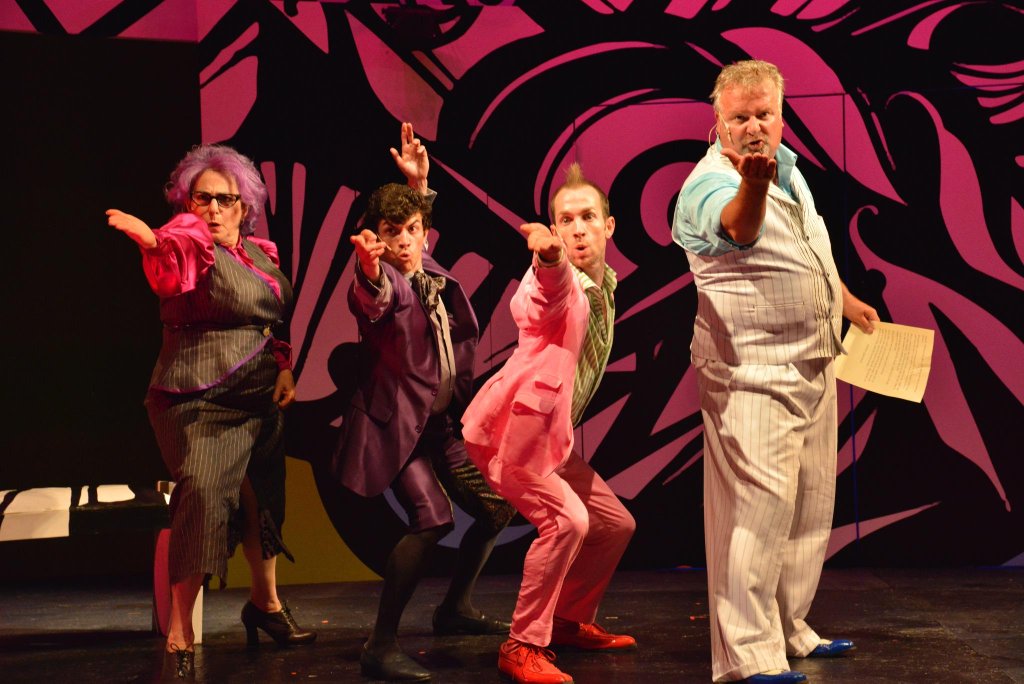Once again it’s time for Commonwealth Shakespeare on Boston Common! This makes my eleventh year attending, and this year Twelfth Night is the show.
Unlike last year’s fiasco (part 1, part 2) there’s not much of a story in getting to the show this year. In fact it worked out quite well as we had plans to visit some friends of my wife who live in the same town as my parents. Visit friends, drop kids off at my parents for a sleepover, and we head into Boston! It rained during the day, but pretty much cleared up by show time.
This year we forego our usual takeout picnic from the local Chinese place and instead opt for “Earl’s Sandwiches” (or perhaps the more obvious Earl of Sandwich) that is located right on the Common. While waiting in line I start talking to another woman about past shows that have been rained out, and I speak of my curse at having missed the 2005 Hamlet. “Oh,” she says, “That one was excellent!”
Son of a …!! Every year! I have yet to meet someone who says, “I missed that one too.”
Ok, on with the show. Context – I’ve never seen a production of Twelfth Night. I’ve read the play, read books about the play, seen portions of a movie version, but never a live production. With that in mind…
We open with the shipwreck, which I quite like. Sebastian and Viola hanging out together on “the ship”, which is really just the upper balcony-type area, surrounded by white billowy sails covering the entire back wall. Instrumental music, the sound of waves. As the storm begins our two come out to the main stage, surrounded by sailors, and life jackets are passed around. A sort of dance begins as the “sails” slide down and cover the stage, rising and falling around them, eventually sweeping them up and carrying them in separate directions. So far so good!
While the remnants of the shipwreck are still on stage, Duke Orsino appears above (where Sebastian and Viola began) for “If music be the food of love…” Interesting enough. Then we cut back to Viola and the Captain.
Now, Viola’s just survived a shipwreck. Her brother is missing. She has no idea where she is. I’d think she’d be at least a little … timid? Confused? I guess I expected something out of her little more than a whisper, but what I got was “WHAT COUNTRY FRIENDS IS THIS! WHAT SHOULD I DO IN ILLYRIA!” like her hearing aid battery had died. Yeow. Maybe that was the sound guy’s issue, or maybe she was trying too hard to project over what was still the noise of the crowd settling down. Unfortunately it set the tone for me that I did not like this Viola. She was … abrasive? I always thought of her as a lost child, dependent on whatever the Captain tells her. This Viola was in fact so confident in everything she said that, during intermission, I heard the person in front of us ask his friends, “Yes, but at the beginning, they clearly know each other, yes? The man says where they are and who rules and she says that her family knows them.”
Excuse me while I jump around a bit. I’m always more interested in talking about characters than plot, and I don’t always get them in the order they appeared.
Sir Toby just goes for the “drunk all the time” thing. This is disappointing in a number of ways. He enters slurring most of his lines…but then during the scene he says everything clearly. Which is it? He also resorts to fart jokes, which I don’t think was particularly necessary. Cheap laugh.
 |
| Image via @commshakes on Twitter |
Speaking of cheap laughs, let’s talk about Sir Andrew. As I said, I’ve never seen the play. I guess I always imagined something of a Falstaff-lite drunken old fat knight just lounging around and having things brought to him? What I got was every old gay stereotype you’ve ever seen, and then some. Our very skinny Andrew, with a blonde mohawk, enters in his bright pink suit (with some sort of flowered shirt underneath) and proceeded to prance and lisp his way through it all. Really? Talk about cheap laughs, these were cheap bordering on offensive. It’s still funny to have the gay guy kick up his heels in a little happy dance every now and then? Or to disguise himself with a headscarf and big alien sunglasses so he looks like Jackie Kennedy?
When I got home at 11pm that night I immediately pinged Bardfilm to ask, “Is Sir Andrew often played gay?”
“No,” he said, confused, “The opposite is probably more likely.”
I don’t know what the director was thinking, truly. If you didn’t know that Sir Andrew is supposed to be courting Olivia, you would have had no clue. It was far easier to believe that Toby was going through a bit of a midlife crisis and had invited his boy toy over for the weekend.
For everything that bugged me about Toby and Andrew, I quite liked Feste. He was precisely what I expected, going with a sort of “hobo” version of the clown with a raggedy-looking suit and hat, bells on his ankles, sometimes entering banging his own drum. He delivered his lines clearly, and they made sense. The way he just kept showing up, and occasionally being called upon to sing, he was almost like a narrator/chorus, just drifting through the story.
Of course, everybody wants to know about Malvolio. He was played by Fred Sullivan, Jr. who I take the time to name because I love this guy as the company clown. He’s our Will Kempe. I’ve seen him play Bottom, Jaques, Parolles… I only wish I could see him play Dogberry I expect he’d knock it out of the park.
But, again, expectations are a funny thing. I always thought of Malvolio as a sort of gangling type, tall and skinny and all limbs, with a snooty voice that immediately makes you go to words like “hifalutin“. Fred’s not that. Fred’s a big dude, so we get this guy who looks like he can be scary when he wants to. When Viola/Cesario refers to him as Olivia’s giant, it makes perfect sense. If he wants to pick her/him up and toss him/her out the front door, she/he’s going flying.
Alas, his humor this year is in the screaming. Later when Toby and crew are having a drunken time and Malvolio breaks it up, he screams everything like he’s going to blow a blood vessel and drop dead on the spot.
It’s as if “over the top” is the slogan for this production, because everything is 10x what it probably could have been. Don’t just be drunk, be fall down slurring your words drunk. Don’t just laugh, cackle long and loud like you can’t breathe. Don’t just be upset, be red faced spitting your words gonna have a heart attack upset.
The theme continues when Malvolio finds the letter. I admit, this scene is hysterical. But again, in that over the top way. Every two seconds, Toby and the Scooby Doo bunch are trying to “hide” on stage but never stop laughing so loud that my wife turns to me and says, “He’s really not supposed to hear them?” And of course the reading of the letter takes 10x longer than it probably should. The whole “M,O,A,I” sequence just goes on and on as he tries to work it out. “Mooohhhhhaaahhhheeeeeee…… moooooohigh…… mmmmmaaaahhh…… mumumumomomommeeemeeemymymy…moo! Moomoo! mama! Miami!” The final “EVERY ONE OF THESE LETTERS ARE IN MY NAME!” is funny thanks to Shakespeare’s material, not the delivery.
Fred comes back around, though, once he’s in the “dark room” (which in this case is a tiny cage that he can’t even stand up in, with both a blindfold and a hood). Now he’s just a miserable sot who doesn’t understand what’s going on around him, trying to explain that there’s been a misunderstanding, he is not out of his mind. I honestly would have to go double check the script to find the details, but if you told me that Feste takes pity on him and reveals the whole joke, I’d believe it. That’s a compliment to both Feste’s role as well as Malvolio’s, as they turn so quickly from giggling idiots to “Wow, look what we did to this fellow human being.”
What of Olivia? I’ve always imagined a younger play, where Duke Orsino is this old rich guy who just wants to be in love and be married, and Olivia is young and not ready to be tied down to a guy like that. All the more reason why she falls so quickly for Cesario, who is closer to her own age and personality. What I got was an Olivia who looked and acted like she’d already been divorced and was now a cougar on the prowl.
And the rest? I realize, when I watch through my wife’s eyes, that this play suffers from too many minor characters. You’ve got characters like Curio and Valentine who are around early enough that the new audience is left to wonder, “Who are they, are they important?” but they’re really not. Meanwhile Fabian, who is important, just kind of shows up several scenes in and you’re left to wonder “Now who’s that guy?”
They did what they could to keep Sebastian and Antonio fresh in the audience’s mind, but there’s not much to work with. When they finally show up for the important plot points to move forward, you have to take a second and say “Wait, now, who’s that guy again?”
All in all, I’m pretty disappointed. After Two Gents last year, I heard they were doing Twelfth Night and found myself telling everyone, “Now, see, this is going to be a good one.” I think the material is strong. Lots of quotes that people will recognize, lots of opportunities to be funny. What we got, from the fart jokes to the gay stereotypes, seemed like it didn’t have enough faith either in the audience or the material.

